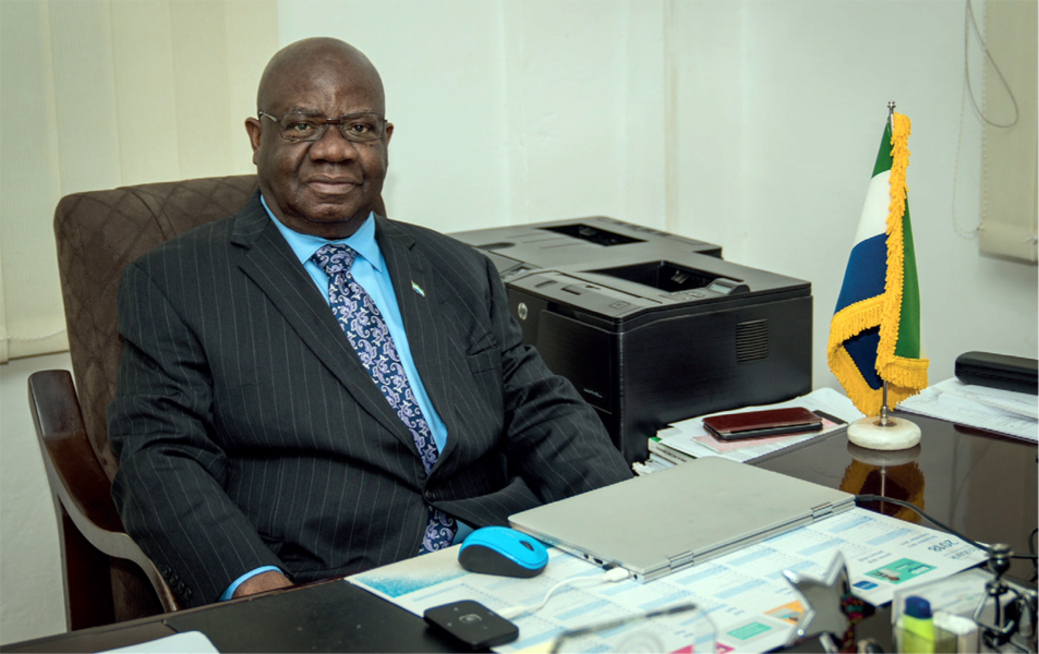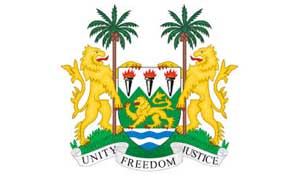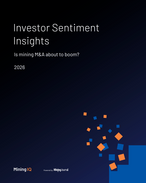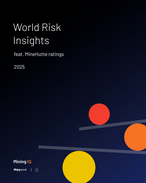Notwithstanding its relatively small size, Sierra Leone is widely recognised as a highly prospective target for mining activities.
"Our country is richly endowed with mineral resources such as chromite, iron ore, platinum, gold, diamond, bauxite, rutile, ilmenite, zircon, base metals and rare earth elements such as columbite - tantalite (coltan)," says Sahr Wonday, Director General of Sierra Leone's National Minerals Agency.
"Our key priority is to enhance knowledge of the full range of minerals in Sierra Leone. In this regard, we are providing support for the Extractive Industry Technical Assistance Project, the main component of which is the airborne geophysical survey to enhance general knowledge of Sierra Leone's mineral potential.
"This will accelerate development of the minerals sector. Planning is well underway with implementation planned for the last quarter of this year."
Wonday says Sierra Leone's mineral deposits "represent major opportunities for both potential investors and the country to derive significant benefits".
The country's mining sector has been the backbone of its economy since mining started in the 1930s. In recent years, and prior to the steep decline in the iron ore price, mining revenue as a percentage of National Revenue Authority revenue was around the 20% mark. Mining sector output as a percentage of gross domestic product also exceeded 20%.
In 2017, the four operating large-scale mining companies - Tonkolili Iron Ore, Sierra Rutile, Sierra Minerals, and Koidu - paid a total of US$52 million to the NRA and other government agencies and employed more than 6,000 people.
"Notwithstanding this significant contribution to the economy, our New Direction Government recognises the fact that Sierra Leone needs to show more for our mineral wealth. We must reverse the resource curse and ensure that Sierra Leoneans derive maximum benefit from our mineral wealth," Wonday says.
"The mining sector should play a critical role in supporting our development agenda and to this end we are committed to supporting the creation of an enabling environment for mineral sector investment for the benefit of our people.
"A key priority is to ensure that our licence-management process is very transparent with allocation of mineral rights based on strict eligibility criteria designed towards attracting only credible investors with proven track records.
"Limitations and inconsistencies in the application of legislative provisions, perceived lack of security of tenure and transparency issues have in the past militated against major players becoming interested in investing in the country. Our New Direction Government will change this."
Wonday says Sierra Leone should learn from countries such as Botswana, Australia and Canada.
These countries have taken steps to promote good governance of the mining sector and integrate it into local value chains.
While, Botswana ensured the establishment of a diamond polishing industry in the early days of its diamond boom, Canada and Australia established mineral processing industries. Coupled with clear legislation, good policies, a stringent legal and institutional framework, and effective regulation to improve good governance, the countries have since derived significant values from their mining industries.
"Good governance of the mining sector is critical for Sierra Leone to attract the right kind of investment and fully maximise the potential benefits of its mineral endowments," Wonday says.
"We will therefore establish a strong and robust governance framework for the mining sector that balances the financial benefits produced for government and the private sector with the protection of communities and the environment.
"We will put in place the legal, regulatory and institutional capacity for the effective management of the sector."
Wonday says this will include:
- Revision of the key legislation pertaining to the mining sector, such as the Mines & Minerals Act in 2009, which legislates for the protection of communities, corporate social responsibility, improved licence management with the Cadastre office, among other things.
- Ensuring transparency in the sector by upgrading geo-data information management system, which aims to manage geological information by developing a geological database, building a network infrastructure and a website portal where pertinent information about the extractive industry in Sierra Leone can be easily accessed. This will include tax and other contributions from the mining sector. Compliance with the Extractive Industry Transparency Initiative will also be a high priority.
- Address conflicting mandates of MDAs and ensure effective co-ordination.
"We will implement an internationally competitive tax regime that is mutually advantageous for both investors and our government. This will provide fair and accommodating taxes, thus ensuring a win-win situation, whereby mining contributes to the sustainable development of our country and its people, as well as ensuring good returns for investors," Wonday says.
"We will support investors by developing clear and accessible guidelines for investment.
In this vein, parliament has enacted an Extractive Industries Revenue Act to consolidate the fiscal requirements of our investors. All existing Mining Lease Agreements will also be reviewed to address the current situation where concessionary tax regimes have not benefited the country.
"A mining company should not be an 'enclave operation', with minimal backward or forward economic linkages required to stimulate economic activities in other sectors of the economy. We will give high priority to strict enforcement of our local content policy and ensure that mining companies train local staff and increase use of local contractors.
"Linkages between the mining sector and the rest of the economy, through infrastructural development, local content and downstream processes are crucial for diversification and broad-based development.
"Furthermore, we will align our national mining policies with regional and continental plans such as the African Mining Vision and adhere to international best practice as outlined in the Natural Resource Charter.
"We will continue to upgrade and maintain our infrastructure, in partnership with the private sector, to attract future investment in the country."
Wonday says community development is also a centrepiece of Sierra Leone's New Direction for minerals.
"We will ensure that our investor partners recognise that they have a responsibility to their host communities," he says. "In line with this, our Community Development Agreement model will form the blueprint for community arrangements between mining corporations and communities going forward. Mining companies will contribute at least 1% of their gross revenue to a community development fund.
"This will provide funding for education, health, and general development of mining communities. We must learn from recent experience in our iron ore sector and plan for a time when revenue streams from the mining sector decline.
"We will therefore pay close attention to compliance with the Public Financial Management Act and application of the fiscal rule to manage the use of mineral resource revenues."
ABOUT THIS COMPANY
Sierra Leone
- A country rich in natural resources
- Iron-ore mining operations have resumed
- Diamond production ongoing from three kimberlite pipes
- Primary gold exploration at an advanced stage
HEAD OFFICE:
- Address: NMA Headquarter, New England Ville, Freetown
- Phone: 00232-79-250702
- Email: [email protected]
- Web: www.nma.gov.sl/




























